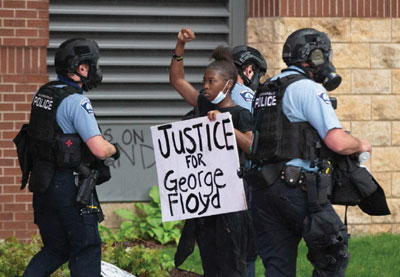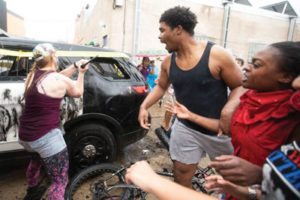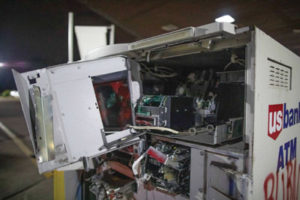
THE WAY WE LIVE NOW:
A midwestern U.S. city processes white-on-Black police violence

Black Lives Matter, they say. His life mattered, they say, until a police officer decided it didn’t. They say.
Minneapolis is the latest U.S. city whose threads are fraying and burning over race relations. Protesters see video footage of George Floyd, accused of forging a check, his neck trapped under police officer Derek Chauvin’s knee, pleading for his life as he labored to breathe. Breathing his last.
Thousands hit the streets—peaceful at first, even polite. A makeshift memorial attracted balloons and roses. The police chief fired four cops and the mayor demanded criminal prosecutions, but justice is a slow drip and Molotov cocktails create loud, roaring fires.
“Good cops are dead cops,” one vandal spray-painted not far from where paramedics found Floyd unconscious.
It was not the first time a white cop killed a Black suspect, and it will not be the last.
This is how Black Americans caught in the middle live now. Worrying and working to protect their spouses, their children, their neighbors’ children. And furious that they must.
The name Trayvon Martin launched a protest movement seven years ago, and more names would follow.
Eric Garner, Michael Brown, Tamir Rice, Walter Scott, Freddie Gray, Alton Sterling, Philando Castile, Stephon Clark, Botham Jean, Cameron Lamb, Terence Crutcher, Laquan McDonald.
Those are just a few whose deaths fit neatly enough into quiet weeks or weekends to become news. There are more.
 Arson doesn’t always follow, nor looters urging city-dwellers to “be the virus.” More shootings are not guaranteed amid chaos, nor innovative ways of cracking open ATMs to harvest what is inside.
Arson doesn’t always follow, nor looters urging city-dwellers to “be the virus.” More shootings are not guaranteed amid chaos, nor innovative ways of cracking open ATMs to harvest what is inside.
Two wrongs do not make a right. But the color of a man’s skin should not matter either, they say.
About 1 in 1,000 Black men and boys in America can expect to be killed by someone wearing a badge, according to Northwestern University research.


Be the first to comment